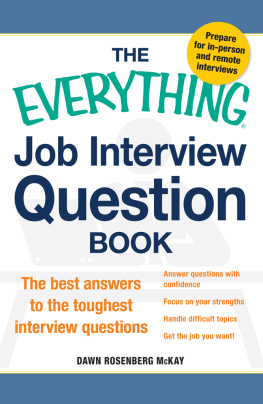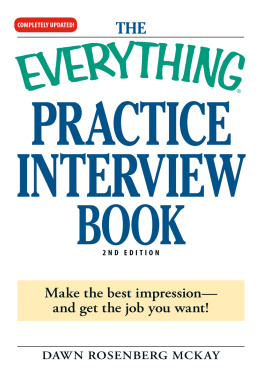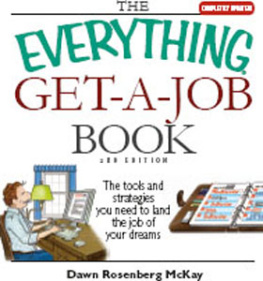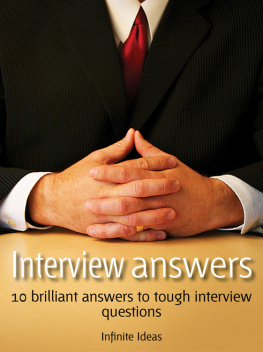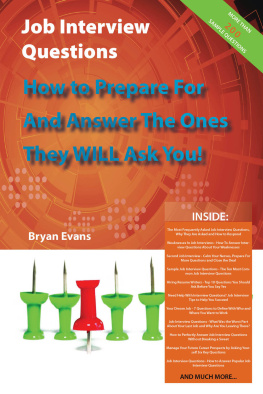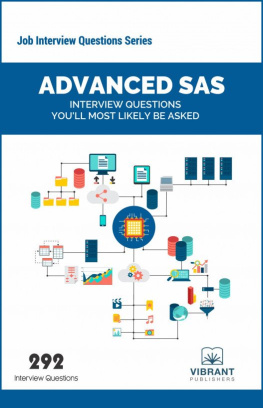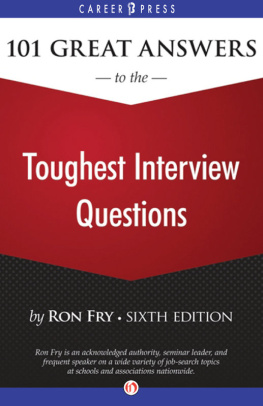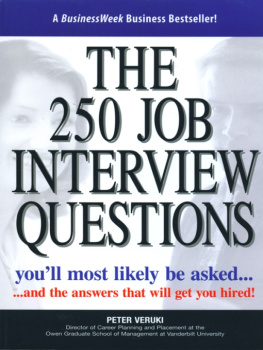THE

Job Interview
Question
Book
The best answers to the toughest interview questions
DAWN ROSENBERG McKAY

Avon, Massachusetts
To Rebecca: Weve given you wings now fly. Weve given you roots dont forget youll always have a home.
To Dean: Without your encouragement and support, having this career would not have been possible.
Contents
Top 10 Things Not to Say on a Job Interview
- That suit looks expensive! How much money do you make, anyway?
- What will my salary be? My rent is very high!
- Ive never heard of this company before. What type of business is this?
- It wasnt my fault I got fired. My boss always had it in for me.
- I quit my job because my coworkers were all idiots. I didnt like working with any of them.
- How much time do you give for maternity leave?
- How much vacation time would I have? I need a lot of time off for traveling.
- If someone files a sexual harassment charge against me, youll have my back, right?
- This isnt exactly what I want to be doing, but lets see what happens.
- Ill really need to have my own office. I dont like working with other people.
Introduction
Wouldnt it be nice if you could send out your resume for a position youre qualified for and simply be offered a job? After all, everything about you is right there on your resume, isnt it? You should know you put it there yourself.
But no, everything about you is not on your resume. Think of your resume as a pencil sketch of who you really are. There is no dimension to it. It has no color and no expression. Basically, its pretty flat. Not at all like you; you are multifaceted. Youve made choices throughout your career. Youve reached certain goals and celebrated many accomplishments. You should have a chance to talk about all of that, because those details are what will make an employer want to hire you.
The job interview is your chance to show your prospective employer who you really are and what you can bring to the position. By asking you questions, a prospective employer can learn all about you and why you made the choices you made. He can discover what motivates you and what makes you proud. The interviewer can find out how you will fit in with his company. Will you get along with other employees? Will you make important contributions to his organization?
There is a lot to accomplish during the job interview. Its perhaps the most important part of the process; its also the most difficult part. Its not like the resume you spent months poring over. You can edit your resume again and again until it lists the most important things about your career and uses the most effective wording to highlight your skills. However, a job interview usually takes place in less than an hour. When you say something, theres no delete key. If you forget to say something, the moment may have already passed by the time you realize it.
That is why it is so very important that you prepare well for the job interview. You wont have another chance to get it right, at least not with the same employer. The more comfortable you are with the entire process of interviewing, the more relaxed you will be when it comes time for the interview, and the better the interview will be.
This book will guide you through the entire job interview process, including everything you need to do before the interview takes place. Discover what you need to do to prepare for a job interview. Learn how to research a prospective employer so you can intelligently ask and answer questions during your interview. Find out how to dress for an interview. Learn about interviewing in another country.
The book is then packed full of sample job interview questions. For each question there is a great answer, an explanation of why you should give that answer, and then an answer you should never give and the reason why. As you go through the questions, think of how you would answer each one, using your own unique traits, experiences, and educational background.
Finally, youll deal with the aftermath of the job interview. Find out what you need to do to follow up on a job interview. Is a thank-you letter really necessary? Of course, the whole purpose of this entire process is to get a job offer. Find out how to negotiate, accept, or reject one. By the time youre finished with this book, youll be able to take on even the toughest interview.
CHAPTER 1
Preparing for the Job Interview
Many people follow a certain routine when they are job hunting. They send copies of their resumes to prospective employers and follow that with weeks of sitting around, waiting to be called back. You should let your competition follow that routine you can make much better use of your time! By preparing better in advance, you will increase your chances of getting hired when you finally do get that call.
Creating Opportunities
Preparing for interviews is time well spent, but only if you have interviews for which to get ready. Otherwise, its like picking out your wedding attire without having a significant other! Lets first discuss what you are doing to create the opportunities to interview for jobs, beginning with locating job openings and presenting yourself as a candidate that gets the phone call (or e-mail) that includes the words When can you come in to meet with us?
These days, you should use online job boards and search engines like Monster.com, CareerBuilder.com, SimplyHired.com, and Indeed.com. In addition to searching for jobs on these sites, you can also post your resume so companies can find you. Many employers also use social media, such as Facebook, LinkedIn, and Twitter, to announce jobs.
Dont forget about networking, both face-to-face and social media. Personal connections are a good way to learn about job openings and spread the word that you are in the market for a new job.
Applying Online
The way we look for jobs has changed and so has how we apply for them. Few employers want you to mail a hard copy of your resume. They will usually ask you to submit online, either through their own site or the site where they advertised the job, like Monster.com or CareerBuilder.com. Alternatively, they might ask you to send it by e-mail.
This resume youre sending what does it look like? If you havent put one together in a while, you may only remember to include information about your past jobs, including the names of the companies, the dates you worked there, and a description of what you did. While all of that must be on your resume, how you present that information has changed. Many employers use automated applicant-management systems. Also called applicant-tracking systems, this computer software stores information about job candidates, including their resumes and cover letters. When you send your application material, it is very likely it will be stored in a program like this. Employers can then use the applicant-tracking system to search through all the resumes they have received to identify those candidates that have the qualifications they are seeking. Why should this matter to you? When you write your resume, you must make sure it includes keywords that will be caught by the system and flag you as a viable candidate. One way to make sure your resume includes the right words is to use one that you customize for each job opening. Read the announcement carefully, particularly the section that lists qualifications, and make sure to include those exact words in your resume. If you are uploading your resume to a job-search site in hopes that an employer will find you, read through announcements for jobs similar to the one you want and use keywords you find there.

